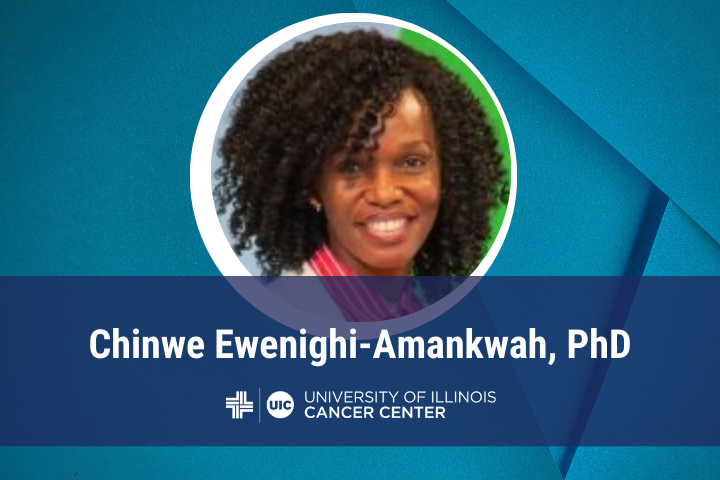
Triple-negative breast cancer (TNBC) is a highly aggressive and metastatic subtype of breast cancer that causes high mortality in Black Americans.
Chinwe Ewenighi-Amankwah, PhD, supported by a postdoctoral fellowship grant through the Illinois Cancer Health Equity Research (I-CHER) Center at the University of Illinois Cancer Center, is leading a research project to evaluate a predictive and prognostic indicator to improve outcomes in Black patients with TNBC.
Triple-Negative Breast Cancer
A postdoctoral fellow in the lab of Cancer Center Director Jan Kitajewski, PhD, Ewenighi-Amankwah is working to understand the therapeutic implications of atypical chemokine receptor 1 (ACKR1) mutations, in patients with TNBC.
ACKR1 (also known as Duffy) is a chemokine receptor expressed on erythrocytes (red blood cells) and endothelium (lining of blood vessels), amongst others, and it assists in leukocyte (white blood cells) infiltration to the site of inflammation.
Ewenighi-Amankwah explained that polymorphism (variants) in the ACKR1 promoter causes loss of ACKR1 in red blood cells, resulting in a “Duffy-null” serotype. Evidence suggests that loss of ACKR1 may result in immunologically “cold” tumors that fail to respond to immune checkpoint inhibitors.
Driving the need to study ACKR1 as a possible therapeutic target is that 60% to 80% of Black Americans are homozygous (having two identical variants) for this polymorphism amidst negative outcomes in TNBC.
This study will use a unique racially diverse breast cancer sample set collected by a consortium of Chicago-area hospitals and assembled into a curated tissue microarray to determine ACKR1 genotype and Duffy null status.
Patients will be stratified into three groups as carriers of wildtype ACKR1, known Duffy null or Duffy low alleles, and carriers of other mutations predicted to cause ACKR1 loss of function.
“The measure of success is the ability to determine if ACKR1 is a risk factor in the TNBC mortality among Black women and can be used as a diagnostic screening tool,” Ewenighi-Amankwah said.
About I-CHER Center
This research project is one of six subawards funded by the I-CHER Center on the University of Illinois Chicago campus, which was 1 of 4 four Minority Serving Institutions that shared in more than $16 million in grants awarded by the American Cancer Society, beginning in January 2022, to establish Cancer Health Equity Research (CHER) Centers. The others were the University of Arizona, Morehouse School of Medicine in Atlanta, and Howard University in Washington, D.C. Each institution received a four-year grant of $4.08 million.
